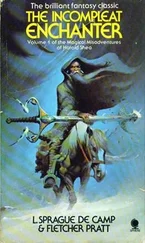L. Camp - The Exotic Enchanter
Здесь есть возможность читать онлайн «L. Camp - The Exotic Enchanter» весь текст электронной книги совершенно бесплатно (целиком полную версию без сокращений). В некоторых случаях можно слушать аудио, скачать через торрент в формате fb2 и присутствует краткое содержание. Жанр: Книги. Описание произведения, (предисловие) а так же отзывы посетителей доступны на портале библиотеки ЛибКат.
- Название:The Exotic Enchanter
- Автор:
- Жанр:
- Год:неизвестен
- ISBN:нет данных
- Рейтинг книги:4 / 5. Голосов: 1
-
Избранное:Добавить в избранное
- Отзывы:
-
Ваша оценка:
- 80
- 1
- 2
- 3
- 4
- 5
The Exotic Enchanter: краткое содержание, описание и аннотация
Предлагаем к чтению аннотацию, описание, краткое содержание или предисловие (зависит от того, что написал сам автор книги «The Exotic Enchanter»). Если вы не нашли необходимую информацию о книге — напишите в комментариях, мы постараемся отыскать её.
The Exotic Enchanter — читать онлайн бесплатно полную книгу (весь текст) целиком
Ниже представлен текст книги, разбитый по страницам. Система сохранения места последней прочитанной страницы, позволяет с удобством читать онлайн бесплатно книгу «The Exotic Enchanter», без необходимости каждый раз заново искать на чём Вы остановились. Поставьте закладку, и сможете в любой момент перейти на страницу, на которой закончили чтение.
Интервал:
Закладка:
Mikhail Sergeivich and Shea ignored them.
They couldn’t ignore one peddlar who’d been too poor even to buy an ox for his cartload of hides. He’d stolen two, and the owner came after them.
The guards couldn’t formally arrest him, but Shea gave him a persuasive lecture about mercenaries needing to stay on terms with Igor much more than they did with thieving peddlers. Igor’s arm was long and his justice swift and stern. The thief already owed fine of a grivna apiece for stealing the oxen. What else was he prepared to risk?
The oxen were returned, leaving the peddler sitting disconsolately on top of his cart in the middle of the steppe.
Then there were the merchants with expensive horses who needed cut fodder and few scruples about where they cut it when their bagged supply ran out. There were the merchants who didn’t hobble their ponies and mules properly when they turned them loose to graze, so that Mikhail Sergeivich had to send out search parties for the strays, risking warhorses breaking legs in rabbit holes and lurking bandits picking off the riders. There was the cart that broke down so that it blocked the only strip of dry ground for half the caravan; it eventually ended in the bog.
There was enough trouble so that Shea was actually glad Reed Chalmers was not with him. The older psychologist was not the world’s most easygoing traveler, and on a journey such as this they’d have given each other migraines, if not ulcers.
It surprised Shea that men who supposedly traveled for a living would make so many simple mistakes on the march. Shea wondered if most of the merchants were actually accustomed to selling their wares locally. If they were traveling now to avoid paying taxes later, they were certainly paying the penalty.
The biggest problem, of course, was keeping everybody from too much sampling of the main cargo. Shea didn’t want to place aversion spells on it, not when his plan depended on free swilling by the right people. He had to fall back on persuasion.
By itself, that would not have been too demanding a job. Mikhail Sergeivich, and Shea as his nominal second-in-command put on a convincing mean captain/nice lieutenant act, which kept the soldiers and most of the merchants in line, most of the time. Once Shea had to draw his sword on a merchant’s servant, and a few other times it took Mikhail Sergeivich and his biggest men cracking a few thick heads to quiet things down.
Fortunately that happened after they were far enough out on the steppe that deserting the caravan wasn’t a good idea. The owners of the cracked heads stayed in the ranks. But Shea and the soldiers walked with eyes in the backs of their heads and their hands close to their sword hilts for a day or two, and went about in pairs after dark.
And everything from sweet reason to cracking heads had to be done during and after days in the saddle, short of sleep and struggling with thirst. As the days dragged on, Shea began to dream about adventuring in a world based on a work written by some cloistered nun a thousand years and a thousand miles away from the actual events. No long trips, no saddle sores, no reeking horse-barbarian camps, no subtler reek of blood from executed traitors!
“How far have we come today?” Shea asked Mikhail.
“A third less than we should have, so far.”
“The devil fly away with this step!”
“Speedily a tale is spun, with much less speed a deed is done, eh? Well, by midafternoon tomorrow we’ll have to send out scouts, anyway — and messengers.”
The messengers would be riding to Igor’s column, well to the rear, Chalmers was traveling with it as a closely watched prisoner, doubtless in no great comfort. But there was nothing Shea could do for his colleague except bring this off.
Over the next few days, Shea found that, this trip anyway, the steppe had no power to hypnotize him. The merchants were settling down for the most part, but the steppe made trouble on its own. A wolfpack stampeded some mules one night, and on another morning, short of water, they reached a spring only to find a dead aurochs in it. That was the longest day of the journey, it seemed, and before they reached the next water source, boredom was the least of Shea’s worries.
They saw no Polovtsi, but endured enough else to test everyone’s alertness to the limit. Even Shea’s dreams of Belphebe grew faint, which he soon realized was just as well. Seeing Belphebe again depended on getting Doc Chalmers out of this jam, and if he’d stopped to think about it, instead of just doing it, he might have convinced himself that it was impossible.
The scouts had gone out as planned, and they brought the good news that the Polovtsi were approximately where they were expected to be, and in about the right numbers — several bands of various sizes. It was another two days before the scouts could, without being detected, pass between the Polovets bands and find the slave caravan.
“Good smiles,” Mikhail Sergeivich said on the ninth day, after hearing the latest report, “The slave train’s heading for Krasni Podok at about the pace we expected. But the two largest bands are coming our way. We’d best have the trade-truce banner up before dawn tomorrow. Oh, and send word back to our friends — they also have to move the way we planned, or they’ll miss the party.
“The party” was crippling the Polovtsi by getting most of them incapably drunk. That was Shea’s job, with Mikhail Sergeivich to lead the mopping-up operations. Another column was to drive through to round up the unprotected slave train before it reached neutral territory, and a third was a reserve.
Thanks to their care in not mentioning Igor’s name, no one had yet connected them with Seversk’s ruler. Some merchants thought the mercenaries might be the last of Sviatoslav Borisovich’s household, fleeing an appointment with the headsman.
“Better hope the weather holds,” Mikhail concluded. “The autumn rains have been known to come this early.”
“I told you. I have no weather magic,” Shea said irritably. “We’ll just have to hope that the water doesn’t come until the wine is gone.”
At dawn the next day they raised the trade-truce banner. At noon a party of eighty to a hundred Polovtsi rode in. The smell was as overpowering as ever, even though this time it was only the men, not the campsite as well. Shea briefly imagined conjuring up a gigantic bathhouse, large enough to clean the whole Polovtsi nation — or deal with them permanently, as Olga had done with her husband’s murderers.
Mikhail Sergeivich left the negotiations with the Polovtsi to a senior member of the vintners’ guild. They came to terms with a minimum of insults, and half the Polovtsi rode away. The merchants started setting up booths and stands, but kept looking nervously over their shoulders at the Polovtsi wandering about.
“These sons-of-bitches,” Mikhail told Shea, “are bad enough when sober, How do you plan to control them when they’re drunk?”
“That’s the point, to get them drunk,” Shea replied. “I’ve been meaning to ask: what does trade law require them to do?”
“To pay for anything they want or break, and to observe the three-day limit. And even then one band once claimed they’d spent a whole day drunk before they looted a border household, so they’d forgotten where they were.
“That only involved maybe fifty Polovtsi. By the time all our friends’ friends get wind of the party and come, we’ll have half the steppe on our hands!”
“What happens when they have something to sell?” Shea asked.
“They stay sober then, and haggle like everyone else. They generally insist on selling first. Then, as often as not, they’ve been known to claim that the coin was bad, or the trade-goods worthless, so they can steal instead of buying in turn.”
Читать дальшеИнтервал:
Закладка:
Похожие книги на «The Exotic Enchanter»
Представляем Вашему вниманию похожие книги на «The Exotic Enchanter» списком для выбора. Мы отобрали схожую по названию и смыслу литературу в надежде предоставить читателям больше вариантов отыскать новые, интересные, ещё непрочитанные произведения.
Обсуждение, отзывы о книге «The Exotic Enchanter» и просто собственные мнения читателей. Оставьте ваши комментарии, напишите, что Вы думаете о произведении, его смысле или главных героях. Укажите что конкретно понравилось, а что нет, и почему Вы так считаете.












